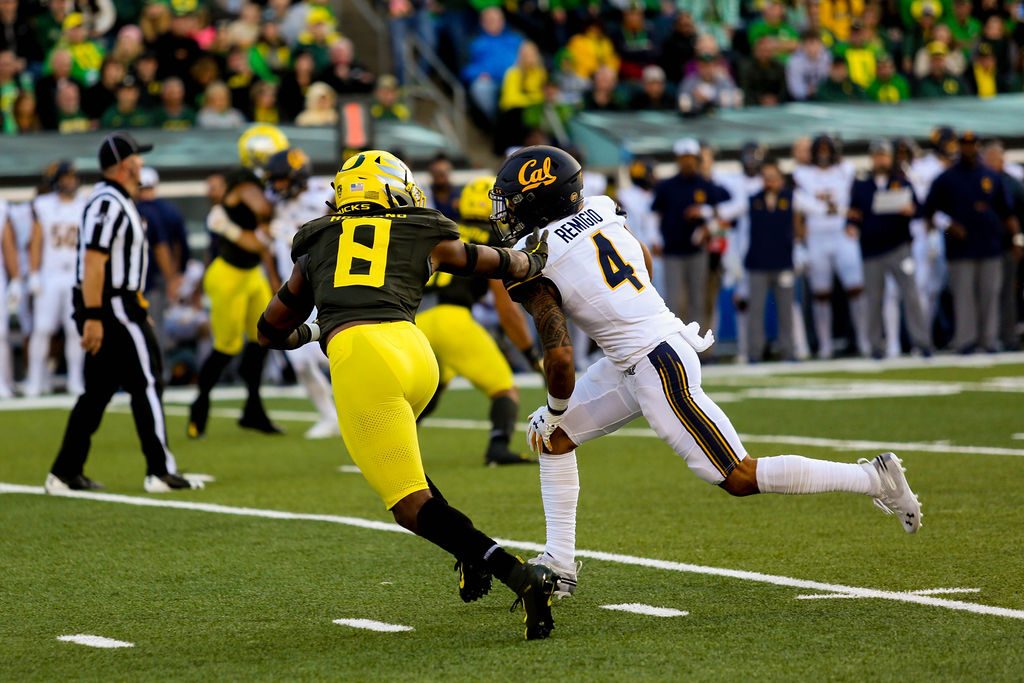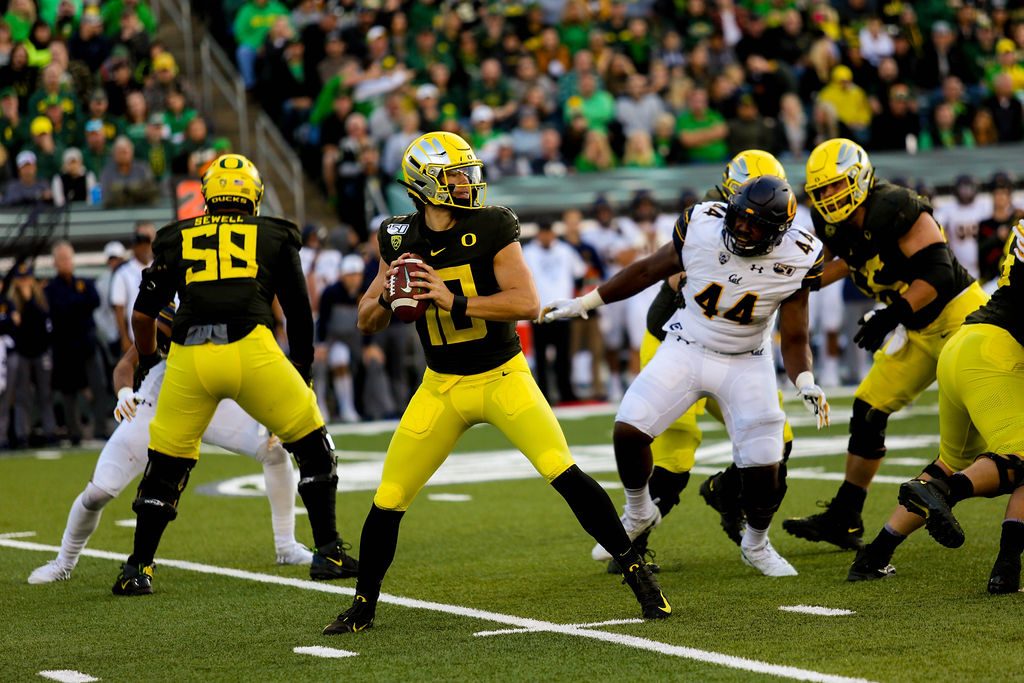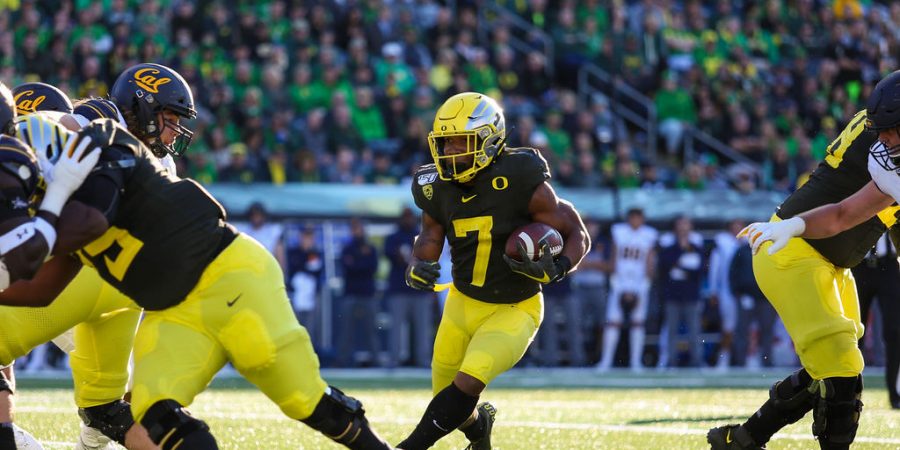As we inch closer to the half way point of the college football season, a path to the Pac-12 title game is beginning to clear for the 13th-ranked Oregon Ducks, who currently reside atop the Pac-12 North division standings.
Entering this past Saturday, the Ducks already had an leg up on the preseason contenders for the division title, as Stanford had already suffered two conference losses (including one to Oregon), while Washington had a loss on the ledger to Cal, who defeated the Huskies in Seattle nearly one month ago. By the time Saturday came to a close, however, Oregon’s lead in the North over these perceived division favorites only swelled, as the Ducks scratched their way to a win over Cal, while Stanford upset Washington in Palo Alto, effectively spotting Oregon a two-game lead with three weeks of conference play in the books.
It’s an enviable, yet unexpected, position of the strength the Ducks find themselves in with just over half a season left to play and the conference appearing primed to cannibalize itself.
But this is no time for back patting.
Consider that even Oregon had a near brush with the upset bug this past weekend, as Cal led 7-0 at halftime sporting a stingy defense that didn’t surrender a lead to the Ducks until the waning moments of the third quarter. In the end, credit goes to the Oregon defense for another smothering performance, as well as the Oregon offense for overcoming three costly turnovers in Cal territory to score 17 unanswered points in the second half to come away with the victory. However, this was far from the statement game many were expecting from the Ducks given the injury concerns surrounding Cal and the return of three key offensive players to the Oregon lineup.
Which begs the question, “Despite the firm lead in the division, how capable is Oregon of taking advantage?”

Based purely on record, Oregon seems like the Pac-12’s best bet to crash the College Football Playoff, but that feels like nothing more than a title by default at the moment.
The good news for Duck fans is that it’s becoming increasingly clear that Oregon is in possession of the Pac-12’s best defense, and perhaps one of best defenses in the entire country. Detractors will argue that the Ducks haven’t played anyone with a consistently above average offense, and they wouldn’t be wrong. But the truth is, the Oregon defense has done nothing through five games this season to indicate that they’re a unit that is prone to mental mistakes or resting on their laurels. Not only have they held their last four opponents to single-digit scoring efforts (the first time they’ve done so since 1960), but the Cal game was their fourth straight game holding a team to less than 300 yards of total offense, the fourth time this season they’ve held an opponent to less than 200 yards passing, and the third time this year they’ve have held an opponent to less than 100 yards rushing.
Pick a defensive category, and there’s a strong possibility the Ducks either lead or are among the conference’s best in that category. This is a unit that is as athletic, deep, and capable of executing at a high level than any Oregon defense in recent memory, and with daunting road tests to come, it’s a group that head coach Mario Cristobal and defensive coordinator Andy Avalos can count on making the trip and performing to the lofty new standard they’ve set for themselves.
The bad news is, the Ducks have real issues on offense and it’s becoming more and more difficult to anticipate consistent performances from that unit from week to week.

Chief among those issues is the stunning lack of identity on that side of the ball. Are the Ducks a team that’s committed to relying on the arm of Justin Herbert and an emerging group of pass catchers? Or are they a power running team built on a desire to own the line of scrimmage and wear opponents down with strength and physicality. Ideally, it’s a seamless combination of the two, but with the last season and a half serving as reliable enough data, it’s fairly clear that between Cristobal, offensive coordinator Marcus Arroyo, and running backs coach Jim Mastro, Oregon’s offensive brain trust is having trouble defining exactly what they want to be and executing to that end.
Of course, the three Power Five teams the Ducks have faced this season deserve credit for presenting problems for Oregon on offense. Auburn, Stanford, and Cal each have reputations for being well coached and quite talented on the defensive side of the ball. Yet, despite that truth, it has has also felt like the Ducks have failed to identify an out pitch they can turn to when the chips are down. Instead, closing out games has mostly consisted of tentative play calling and execution, and a general hope that the offense can do enough to simply hang on.
In the past, Oregon’s scheme and philosophy provided guiding principles – a north star of sorts – that helped dictate the approach in a given situation during the course of a game. Currently, there’s no sense that exists in any tangible way. Depending on the week, the Ducks seem to oscillate between a pass-first or run-first operation, with the shortcomings from the previous week seeming to serve as the impetus for what the Ducks hope to accomplish the following week.
Perhaps that has been driven by personnel – particularly at the skilled positions – the last couple seasons, which has been substandard compared to what the Ducks have been used to over the past couple decades. But even then, Oregon has been no stranger to having modest talent relative to the rest of the conference, as scheme and coaching often found ways to maximize those players and their abilities, negating whatever perceived talent advantage Oregon’s opponents have had. That’s not really the case anymore, as offensively, there seems to be limitations to what the Ducks’ current coaching staff can cook up from an X’s and O’s standpoint, even with the marginal progress that’s been made in that area from a year ago.
The opportunity that sits before Oregon is undeniable, as are some of strengths the Ducks possess at quarterback, offensive line, and defense, in particular. But even with destiny in their own hands and a clear path to the Pac-12 Championship Game set out before them, Oregon has miles to go to prove they are indeed the class of the Pac-12, and not a team that has simply yet to be tailspun by a conference full of potential landmines.

